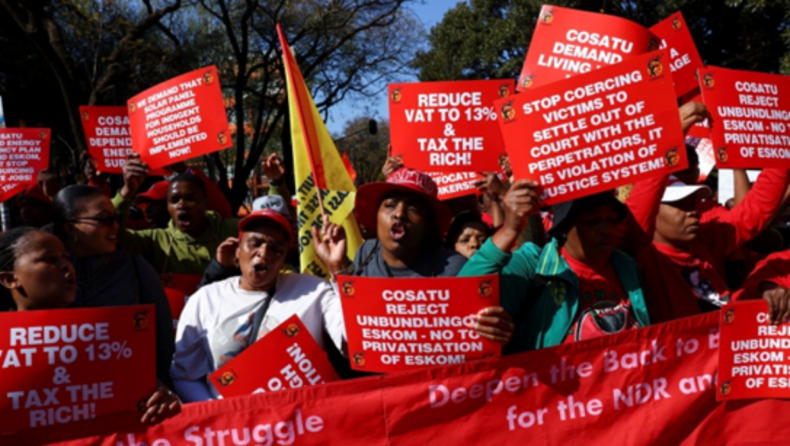Worker unions in South Africa took to the streets of the capital to protest for a plethora of reasons.
The protest is organized by South Africa’s eight worker unions against the rising cost of living, high unemployment levels, and power cuts.
Thousands of people embark on the streets of Pretoria, the capital city of South Africa, on Wednesday to protest against the tumbling economy.
The protestors marched towards the government building and handed over a memorandum to the authorities.
The protestors have common concerns about the high cost of living and its burden being specifically on the working class, who is struggling to survive in these economic conditions.
What is the state of the economy?
Two major catalysts in the deterioration of the economy have been the COVID-19 pandemic and Russia’s war on Ukraine.
Due to this inflation has been soaring worldwide, along with disruptions in supply chains as well as rising energy and food prices.
This has resulted in rising costs for necessities including, food, electricity, medication, and fuel.
At the front of the march in Pretoria, one woman who didn’t give her name told the BBC why she was on strike: “We’re tired. The cost of living is too high now – we can’t afford anything anymore. It’s school fees, it’s transported, it’s rent, it’s everything.”
Talking about some statistics, according to a report by the World Bank, about 30.3 million South African citizens are living in poverty. While 13.8 million people are exposed to food scarcity which has been further increased by increasing prices of food due to the Russian invasion of Ukraine.
The problem of Electricity supply still needs to be fixed and made available for continuous hours.
Inflation rate in South Africa

Inflation skyrocketed to the highest level in 13 years in July, mainly pushed by high prices for food, transport, and electricity.
According to the national statistics agency StatsSA, consumer prices rose by 7.8 percent in July after reaching 7.4 percent in June.
Basic food items have now become a luxury for the common man in South Africa as the prices have shot up by 10 percent in the last year itself.
Prices for bread and cereals were up by 13.7 percent in July from 11.2 percent in June. It means a loaf of white bread now costs 17.84 rands ($1.05) compared with 15.57 rands ($0.91) a year ago, StatsSA said.
The citizens are left open to all these vulnerabilities when the employment rate hovers near 34 percent.
On the other hand, fuel prices increased by 56.2 percent from last year.
Does the government care?
The government is acting lazily and is yet to react to the strike.
South Africa is governed by the African National Congress (ANC), which is a part of a tripartite alliance along with the Congress of South Africa Trade Union (COSATU) and the South African Communist Party.
This puts the government in a difficult spot as it depends on the union’s vote and the support of other parties as well.
The ANC can not ignore the protest for a long time as the unions do have a lot of bargaining power.
Cyril Ramaphosa, who is the current president of South Africa currently has been criticized by the former South Africa Thabo Mbeki, saying that there is no national plan to address the current situation of the economy.
He even accused Ramaphosa of failing to curb government corruption as he promised.
The protestors in Pretoria said that they aim to bring the economy to a halt but the fear that the number of shutdowns could be less than the number of protestors is making them think.
Also, the government says a “no work, no pay” principle will apply.













